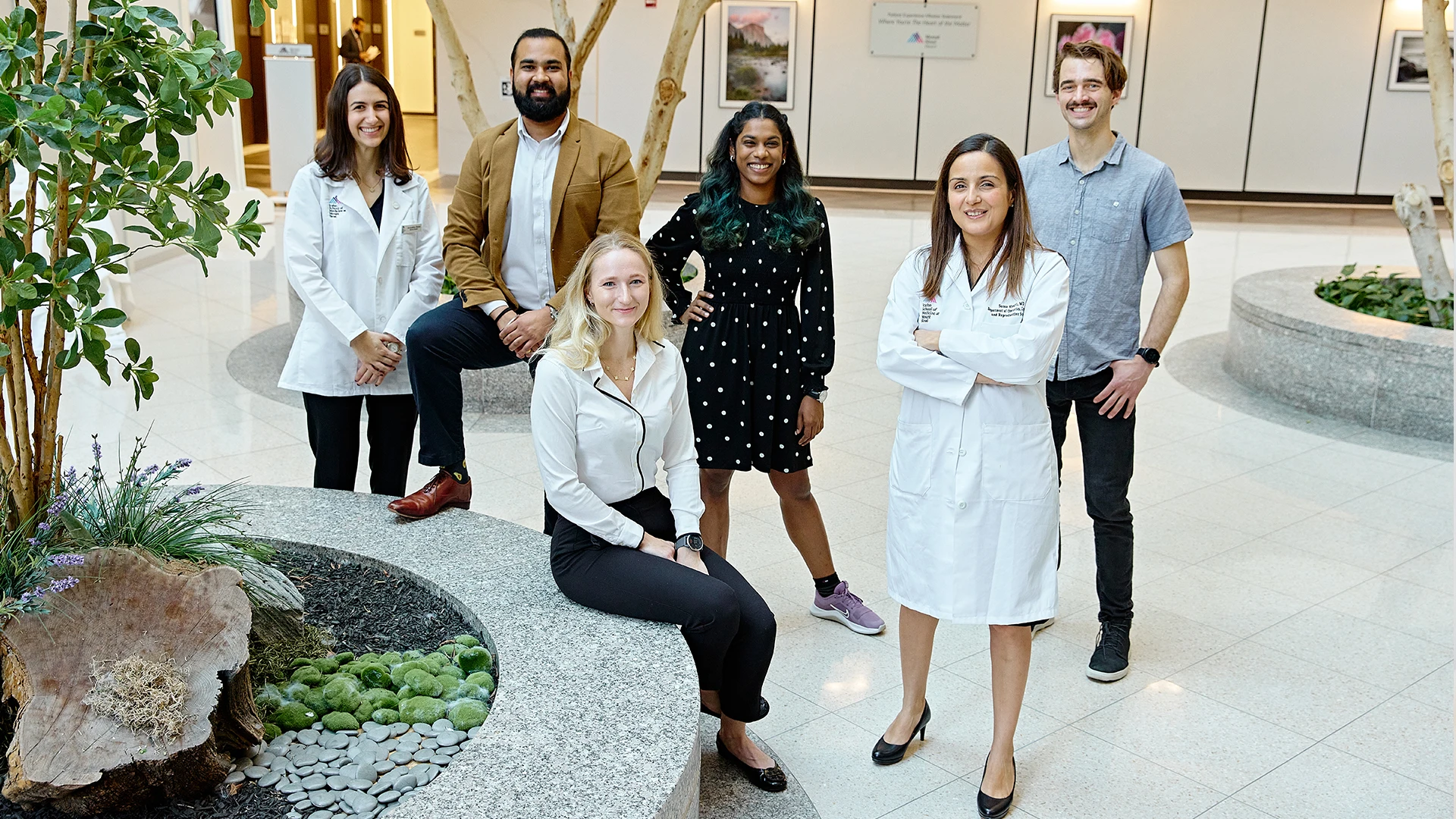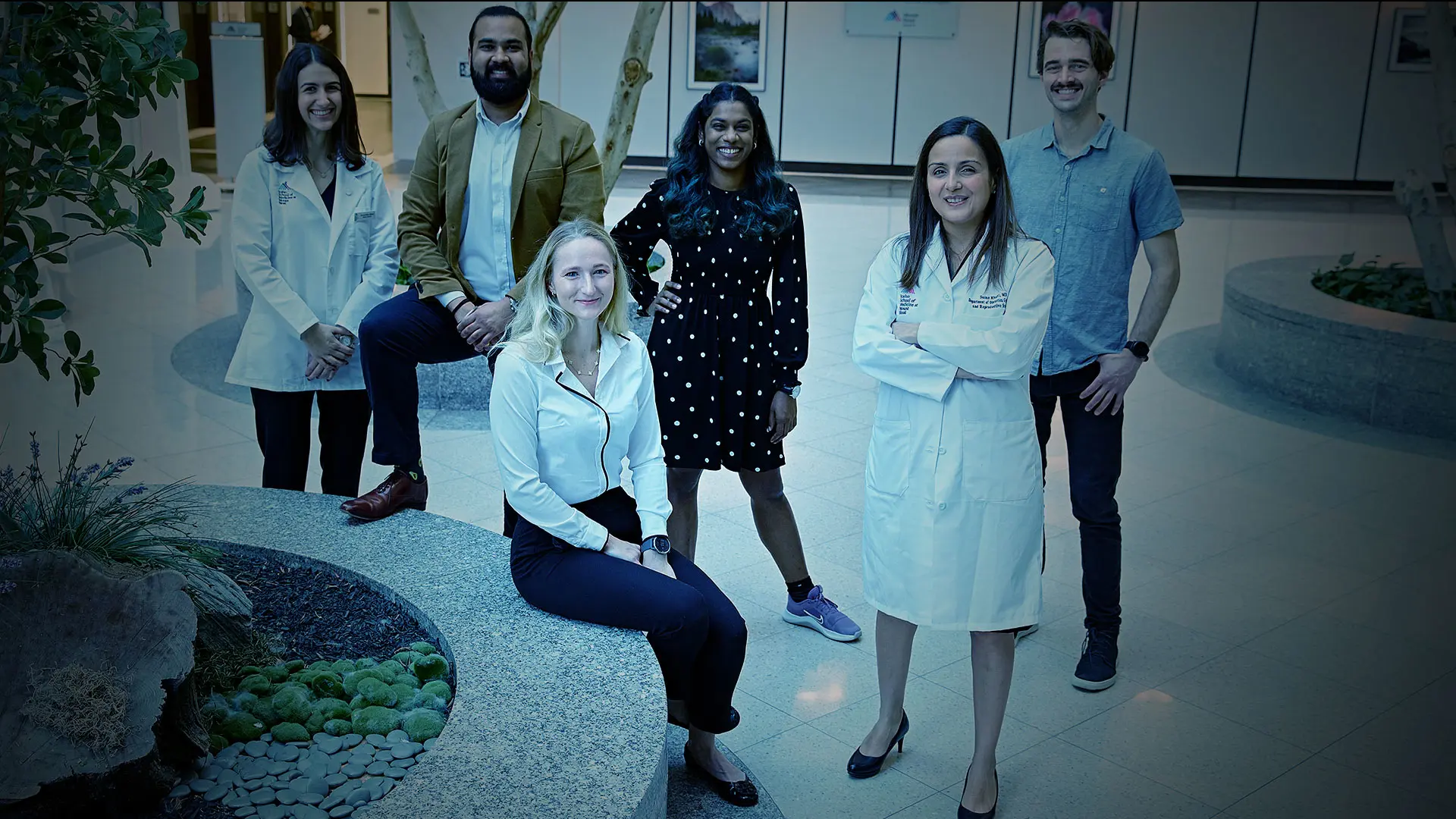Backed by a team of highly motivated graduate school students—and an array of linked training opportunities in biomedical entrepreneurship at Mount Sinai—that goal is now on a fast track to become an eventual clinical and commercial reality.
Specifically, Dr. Khalil, who is an alumna of the Graduate School’s Master of Science in Health Care Delivery Leadership (MSHCDL) program, and the five students on her team developed an innovative clinical decision support system known as EndoCare to facilitate early-stage detection of endometriosis, a misunderstood disease that affects one in every 10 women of reproductive age. EndoCare integrates the well-honed surgical suite observations of Dr. Khalil with MRI imaging from a large cohort of hospitals to create a deep learning algorithm designed to give physicians a dependable tool to analyze the condition of their patients and shorten the time from disease suspicion to actual diagnosis.
“EndoCare is a fantastic example of a clinician with a novel idea converging with students who have biomedical, technological, and data science knowledge to move their innovation along a commercializable pathway.”
– Brian J. Nickerson, PhD, JD
The uniqueness and sophistication of EndoCare have already garnered attention. The project won the 2023 annual Mount Sinai Pitch Challenge and received a $25,000 prize to continue advancing the technology. The team recently was accepted into the National Science Foundation’s (NSF) prestigious national Innovation Corps (I-Corps) program.
“This team leveraged the accessible entrepreneurial education apparatus at Mount Sinai and is continuing to validate the need for that solution using the I-Corps methodology of customer discovery. This methodology is something we encourage all innovators to use while developing any technology or solution at Mount Sinai,” says Dov Shamir, PhD, Senior Manager of Entrepreneurship at Mount Sinai Innovation Partners (MSIP) and Co-Principal Investigator for the NSF I-Corps Hub: New York region’s site at Icahn Mount Sinai.
“EndoCare is a fantastic example of a clinician with a novel idea converging with students who have biomedical, technological, and data science knowledge to move their innovation along a commercializable pathway,” says Brian J. Nickerson, PhD, JD, Senior Associate Dean for Master’s Programs and Director of the MSHCDL program. He served as a mentor to Dr. Khalil, as well as to a few of the student team members, and is a strong advocate for her project.
“The health system and academic leadership of Mount Sinai have done an exceptional job of encouraging trainees and graduate students to be innovative and to experiment with new ideas that can lead to innovation,” says Dr. Nickerson. “It’s a unique value proposition that’s not present at many academic medical centers.”
Dr. Khalil can well attest to the benefits of that pervasive entrepreneurial spirit. By enrolling in the MSHCDL program, she was able to make the vital connections that allowed her to get her long-time idea off the ground.
The course is designed to expand the horizons of its students beyond clinical outcomes to health care on a population scale. A volunteer team of graduate students coalesced after Dr. Khalil pitched her plan. “I told them I wanted to revolutionize the care and diagnosis of endometriosis for all our patients,” she recalls, “and that led to the creation of a really cohesive team in which each member has a distinct area of knowledge and expertise. That structure has helped us to propel this project forward.”

The EndoCare team, from left: Jacqueline Slobin; Vibhor Mahajan; Adriana Sistig; Riya Murty Bandanapudi, MBBS; Susan Khalil, MD; and Benjamin Fox.
Those members include Jacqueline Slobin, a first-year medical and Master of Public Health (MPH) student. “It takes a woman 10 years to get a diagnosis of endometriosis, and the only way it can be done is through laparoscopic surgery,” Ms. Slobin says. “Our technology aims to create a faster, more accurate, and less invasive way to diagnose endometriosis.”
Serving as technical leads for the team are first-year PhD in Biomedical Sciences students Adriana Sistig and Benjamin Fox. In addition, Riya Murty Bandanapudi, MBBS, who is also enrolled in the MPH program, brought her public health insights to the group, while Vibhor Mahajan, a third-year student in the PhD in Clinical Research program, provided strategic input as a Venture Fellow with MSIP. Mr. Mahajan says that MSIP “provided us with a platform to refine our ideas, engage with industry experts and the startup ecosystem, and receive a lot of invaluable feedback.” Going forward, the team will continue working with MSIP to further develop EndoCare’s commercialization strategy.
After successfully making it through the regional I-Corps program, hopes are high among the EndoCare team that this journey will take them to the national program in summer 2024. Tellingly, it is one of five entrepreneurial teams from Mount Sinai that have been accepted within the last year for this honor, the most ever for Mount Sinai.
“It’s a new high watermark for Mount Sinai and a byproduct of our Graduate School and MSIP working closely to get students trained to compete and be successful in these kinds of programs,” says Dr. Nickerson, who coordinates activities between MSIP and the Graduate School.
After successfully making it through the regional I-Corps program, hopes are high among the EndoCare team that their journey will take them to the national program in summer 2024.
For Dr. Khalil, the gathering success of her venture is a rewarding validation of her tireless work and perseverance to turn a high-wattage idea into a viable venture. She, in turn, credits Mount Sinai and its Graduate School programs with carving out a nurturing pathway that allows brainstorms such as hers to flourish. “They provided me with a full range of support and helped me take down the barriers that sometimes limit physicians from being included in the innovation process,” she says. “It’s a truly great program that capitalizes on the larger culture at the institution, encouraging and supporting people with diverse skills, such as surgical, pathology, and radiology, to work together in innovative ways to transform health care.”
To learn more about the project, and to hear from the students, go to https://www.youtube.com/watch?v=XhFKA9asHok.
Get to know the team behind EndoCare, who created a clinical decision support system designed to facilitate detection of early-stage endometriosis to improve patient outcomes and promote health care equity. EndoCare won the annual Mount Sinai Pitch Challenge, receiving $25,000 to continue advancing this technology to patients.
